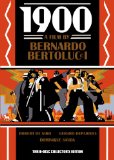| Reviews & Columns |
|
Reviews DVD TV on DVD Blu-ray 4K UHD International DVDs In Theaters Reviews by Studio Video Games Features Collector Series DVDs Easter Egg Database Interviews DVD Talk Radio Feature Articles Columns Anime Talk DVD Savant Horror DVDs The M.O.D. Squad Art House HD Talk Silent DVD
|
DVD Talk Forum |
|
|
| Resources |
|
DVD Price Search Customer Service #'s RCE Info Links |
|
Columns
|
|
|
1900
THE MOVIE:
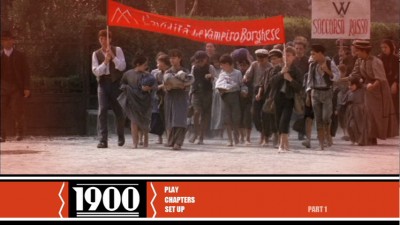
I have a fascination with sprawling genius. I remember watching TNT's restoration of Erich von Stroheim's Greed as a teen, having been pointed in its direction by Siskel and Ebert, and being taken with the idea that there could be this massive thing, that it could exist and hold your attention, and that there was even more of it out there if only someone could find it. (TNT's version was four hours long, though the original cut was up to ten.) In this age of television, and with theater owners desperate to squeeze as many showings out of a film as they can in any given day, we've been trained to believe that films should be 90 minutes to two hours, tops, though in reality there is no inherent meaning to those numbers. Casablanca is 102 minutes, Satantango is seven hours. Neither is good because of the running time stamped on the box; both are good because the filmmakers knew what their story required.
Bernardo Bertolucci's 1977 film 1900 is, structurally, a cinematic novel. It examines the intertwining lives of two boys, one a peasant and the other a child of privilege, born on New Year's Day in 1900 on the same estate. The peasant boy's grandfather (Sterling Hayden) runs the fields for the rich kid's grandfather (Burt Lancaster). They couldn't be closer, and yet they couldn't be farther apart. The film follows them as they grow up and takes us to the end of World War II in 1945, and 1900 shows us their loves and struggles in between. The European cut is 315 minutes long, so just over five hours. For years, film fans could only get the "international cut," which at a mere three-and-a-half hours is still pretty damn long by conventional standards, but lacking in the richness that the added 120 minutes allows. Olive Films has re-released the director's version, spreading it over two parts on two discs (plus a bonus disc). This is the version you want, in whatever form you find it.
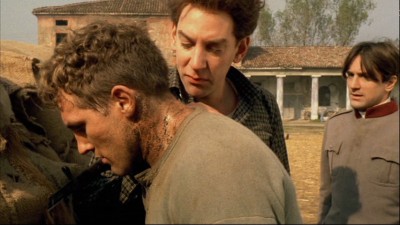
After a brief flash-forward, Part 1 of 1900 doubles back and starts at the beginning of the century. The peasant child, Olmo, has just been born, and the patriarch of the Berlinghieri family (Lancaster) eagerly awaits the announcement of Alfredo's arrival. The old lion believes that the timing of the event means something, that these two boys are linked by destiny. This prediction proves to be right. Throughout their childhood, they fight and play and the bold Olmo (here played by Roberto Maccanti) teaches a timid Alfredo (Paolo Pavesi) about living in the real world, as opposed to the one inside a mansion. This includes convincing the moneyed heir that he is a Socialist, much to the chagrin of his father (Romolo Valli).
The boys are separated by war--Olmo goes off to fight, while the Berlinghieri connections buy Alfredo an undetermined, but seemingly safe position (to Aflredo's embarrassment)--but when they return, the same rivalry comes back with them. Olmo (now played by Gerard Depardieu) is a Bolshevik activist, along with his wife Anita (Anna Henkel). Alfredo (Robert De Niro) is closer to a hedonist that he is a Communist, though he's really neither. The boy has yet to become a man, and he's bending to different influences, trying a few things out. He sows many a wild oat, and his quest for decadence even provides some temptation to Olmo. This is especially so when Alfredo brings home the mysterious Aida (Dominique Sanda, who was also in Bertolucci's The Conformist). When at home, Alfredo still kowtows to his father, who still pushes him away from Communism. The way the political landscape is changing, a failure to take sides is seen as its own kind of betrayal. Fascism is rising in opposition to the growing worker's movement, and it's landing on Alfredo's doorstep. The appropriately named Attila (a particularly creepy Donald Sutherland) is more than willing to enforce the rights of the landowners, including the Berlinghieries, if it means bashing in a few heads. In one horrifying scene, he demonstrates this on a cat. Even without Bertolucci showing us the gory details, it's hard not to look away when the moment comes.
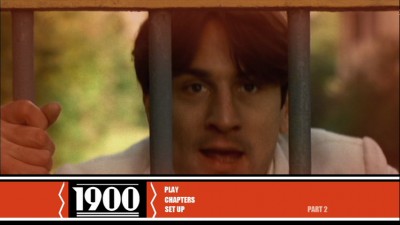
Despite opening on a serene beach, Part II does not take us to happy, colorful territory. Instead, Part II is where things fall apart. This darker half of the film is the more cohesive, satisfying portion (even if the aging effects are overzealous; De Niro is a pretty advanced 45 year old). Alfredo is gallivanting around with Aida and his libertine uncle (Werner Bruhns) when word comes that his father has passed away, forcing him to return to the estate and take charge. Accepting an adult role at last, Alfredo marries Aida, but his poorly considered ascent to the throne comes with an immediate price: by not expelling Atilla from the homestead and renouncing fascism, he is branded as one of them. Though Alfredo correctly sees the winds of change blowing in favor of the Black Shirts, he doesn't consider that a breeze eventually dies out.
Part II of 1900 details the years leading up to war and takes us through the end of World War II, back to where we started, Liberation Day 1945. Free from the yolk of fascism, and with the Nazi occupiers on their way out, Olmo's faction takes control of the Berlinghieri land. The struggle has shifted, and the up-and-down relationship of the two men, it appears, will finally be settled. For all intents and purposes, 1900 is a story of two brothers, two halves of a whole that is constantly in contention. This is particularly emphasized by the film's last scene, which is overdone and a tad bit silly, particularly as a cap to such a large endeavor, but it gets the job done regardless.
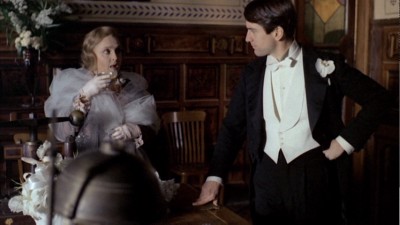
It's incredible to see De Niro and Depardieu on screen together. If you only know Gerard Depardieu from the last ten or twenty years, it's really worth backing up to see him when he was young and virile. His presence on camera is dynamic, and there are a lot of different facets to his performance as Olmo. The man is cagey, cautious, and also determined, and the French actor sells all of this mostly through facial expression and body language. Much of his vocal delivery is flat, perhaps due to the language barrier, but it only adds to Olmo's mystique. De Niro carefully crafts his performance around Depardieu. Alfredo is an overgrown child, and he builds off of that. When you think about it, he's playing closer to Michael Corleone here--brash youth, the rejection of the family, coming around to being what you despise--while Depardieu's performance is closer to De Niro's Vito. He is quiet and dangerous.
1900's scope would prove to be right in Bernardo Bertolucci's wheelhouse. This was years before The Last Emperor, a far more sophisticated, polished epic, and one that deserved all the accolades it garnered. 1900 has a bit of a checkered critical history, as even at its most complete, it is checkered itself. One thing you can't fault it for, though, is the art direction. Bertolucci and company simulate the early 20th Century with a particular eye to the ragged details. These were poorer times in a rough part of the world. 1900 is not shiny and clean like a lot of period pieces. It's dirty and fraying at the edges. As technology advances and riches are amassed, we begin to see the difference, and this certainly adds to the class distinctions. The reverse is true for how we see the countryside: in the earlier parts of the movie, when times are good, the fields are golden and bright. By the time Attila is having his way, they are grey and muddy.
It's this marriage of dualities that makes 1900 work, and most specifically, in how the story embraces both the political and the personal. The rise of the working class and the opposition to it is an important and fascinating story, one with lots of good things, but historically the movement had its problems, too. Bertolucci doesn't whitewash the cause or those fighting for it. The poor are just as selfish as the rich, and there is some amusing evidence of this even as they are in sight of their paradise. In terms of the two main characters, it's always personal. It's either about a woman, or their own egos, and 1900 seems to be saying that, regardless of progress, how we treat each other as fellow citizens will never advance as long as improvement is still reliant on us. We will always be imperfect.
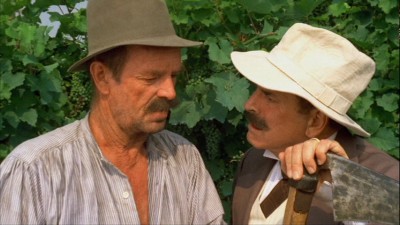
THE DVD
Video:
Olive Films brings 1900 back to shelves as a three-disc package, spreading the movie over two DVDs. This is not the first time it has been on DVD (though Olive has also released the first North American Blu-Ray, as well), but it does have a slight edge on being the best. Specs on the discs are almost identical to the excellent 2006 release from Paramount, though the new version is at a 1.78:1 aspect ratio, not 1.85:1. This is a change that you are likely only going to notice if you are really familiar with the film. As you can see in the comparisons below, the framing is remarkably similar, with Olive actually maybe gaining a little in terms of visible information. Olive also has a slightly brighter picture, and I'd also say stronger resolution overall. Maybe not enough to swap out the package if you aren't upgrading to Blu-Ray, but enough to go this way if you're buying for the first time.
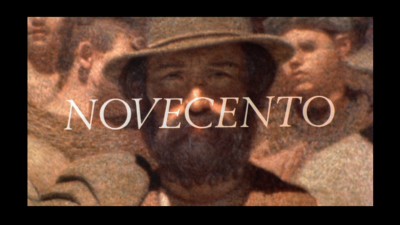
Paramount, 2006
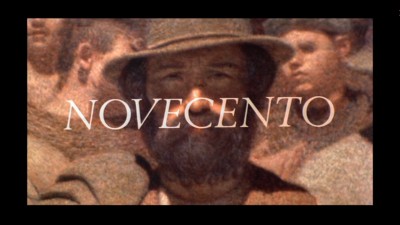
Olive Films, 2012
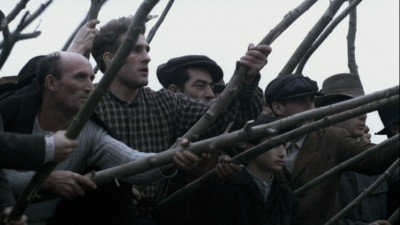
Paramount, 2006
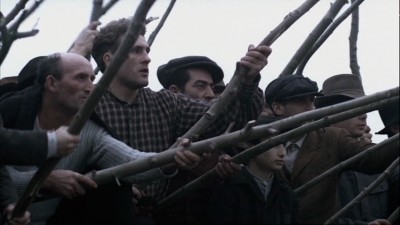
Olive Films, 2012
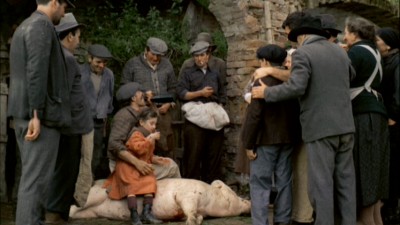
Paramount, 2006
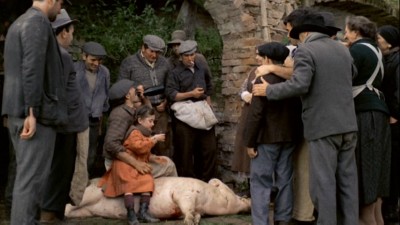
Olive Films, 2012
The Olive Films transfer is not without its flaws. There is the occasional digital noise, and the restoration itself is far from perfect (a stray hair here, a mark on the print there), but the problems don't add up to very much in the grand scheme of things. The overall look of the DVD keeps in line with the film stock of the 1970s, so the muted palette is part of that, and should be expected/applauded.
Sound:
Audio choices mirror the Paramount disc: a 2.0 English version, and both French and Italian versions in mono. As Italian productions featuring international actors were quite regularly filmed in multiple languages at once, it is not uncommon to have a full audio mix made for the country of each particular actor (financing, for instance, probably relied on the fact that Depardieu would make the movie viable in France, De Niro in the U.S.). I opted for the English because I wanted to hear De Niro, Lancaster, and Hayden speak in their own voices. The mix itself is good, without any hiss or glitches, though not necessarily a knockout.
English subtitle are available regardless of the mix you choose.
Extras:
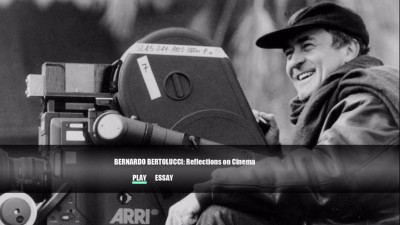
Disc 3 is devoted entirely to the 52-minute career retrospective (well, up until 2002 when this was made) Bernardo Bertolucci: Reflections on Cinema. It's a good program, though I think it has been on DVD as an extra before.
The two featurettes from the Paramount edition are not carried over here.
FINAL THOUGHTS:
Highly Recommended. 1900 is an unwieldy, imperfect, yet altogether rousing epic from filmmaker Bernardo Bertolucci. It stars Gerard Depardieu and Robert De Niro as boys on opposite sides of the class divide who are born on the first day of the 20th Century. The movie's extended narrative follows them as they grow up and grow old, looking at how their lives intertwine and studying how, for as much as they are connected, they are also always apart. 1900 has had its own troubled history, but thankfully, the onset of the DVD age has meant cinema fans have had access to Bertolucci's intended cut. Olive Films is only the latest to release the 5 1/2-hour version, but they do distinguish their edition by making it the best so far.
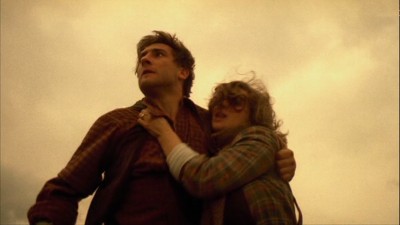
Jamie S. Rich is a novelist and comic book writer. He is best known for his collaborations with Joelle Jones, including the hardboiled crime comic book You Have Killed Me, the challenging romance 12 Reasons Why I Love Her, and the 2007 prose novel Have You Seen the Horizon Lately?, for which Jones did the cover. All three were published by Oni Press. His most recent projects include the futuristic romance A Boy and a Girl with Natalie Nourigat; Archer Coe and the Thousand Natural Shocks, a loopy crime tale drawn by Dan Christensen; and the horror miniseries Madame Frankenstein, a collaboration with Megan Levens. Follow Rich's blog at Confessions123.com.
|
| Popular Reviews |
| Sponsored Links |
|
|
| Sponsored Links |
|
|
| Release List | Reviews | Shop | Newsletter | Forum | DVD Giveaways | Blu-Ray | Advertise |
|
Copyright 2024 DVDTalk.com All Rights Reserved. Legal Info, Privacy Policy, Terms of Use,
Manage Preferences,
Your Privacy Choices | |||||||









